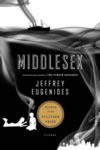Middlesex
by Jeffrey Eugenides
This slow, strange, compelling exploration of gender and of narrative form starts from a remarkably little-known fact: a huge number of people, perhaps one in 2000, are neither clearly male nor female when they are born.The narrator, Cal (formerly Calliope) Stephanides, was raised as a girl and discovered, at 14 and to everybody's astonishment, that she was a boy. He's now a very literate, soft-spoken bureaucrat in the foreign service, posted to Berlin.
Calliope's journey (and the long journeys of her parents and grandparents whose formidable problems led to her complexly tangled genetics) gives Eugenides plenty of scope to explore the meaning of gender, and even greater scope to wander through the corridors of history, from the burning of Smyrna to an astonishing theory of the identity of Fard Muhammad, founder of the Nation of Islam.
But all this, in the end, is occasion rather than substance, the raw material with which Eugenides constructs a very complex and intriguing experiment with plot. There is no melodrama: we know from the first page where we'll wind up, and we soon learn why, and yet Eugenides slowly, gradually coaxes us into excitement. Eugenides appears uninterested in linear plot -- he's a Coover disciple, after all -- and yet he's got the entire framework of a full-scale Dickensian braid expertly humming.
We move from the flames of Smyrna to the burning of Detroit in 1967, from the scarcity of eligible women in the failing Greek colony of Asia Minor after the First World War to the scarcity of straight men in Berlin who want to go out with a self-assured Japanese-American. The American is the bicycle-toting Julie Kikuchi whom Cal sees, one day, on the tram and with whom he reluctantly (but rapidly) falls in love.
As a special dessert, Eugenides writes an extended love story about Calliope's first passion, an adolescent crush on a fellow schoolgirl (one of the set she calls The Charm Bracelets) who she can't name and so calls The Obscure Object. For pages on end, we have The Object in class, at her summer house, in bed. We have her father, the hard-drinking "Mr. Object". To pull this off even briefly is a stunt; to make it work over a span that would make a small novel in itself is astonishing.
